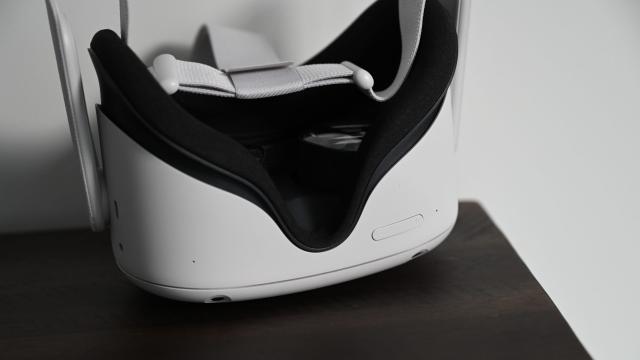Beginning next month, Oculus will roll out multi-user accounts and app sharing, in a move meant to make it easier for multiple people to share a single headset. The feature will first launch on the Quest 2 before rolling out to all Quest devices, and yes, you will have to do this using your Facebook accounts.
In a blog explaining the new features, Oculus notes that for multi-user accounts, you’ll have to designate a primary account holder. That person can then add up to three secondary accounts, but app sharing can only be enabled on a single headset. As in, if you’re a secondary account holder, you can only launch the primary account holder’s apps on that shared Quest 2. If a secondary account user buys their own Quest 2 down the line, it won’t work. Secondary account holders also won’t be able to share apps they buy with any other account. If you do enable App Sharing, you should also know that while you can log onto multiple devices at the same time, you can’t run the same app on that account on different headsets simultaneously. Also, if you want to change who the primary user is, you have to do a factory reset.
For developers, Oculus says apps will automatically be opted into App Sharing beginning Feb. 13. If developers aren’t keen, they’ll need to opt out by Feb. 12. Any new Rift or Quest apps that are created after Feb. 13 must support App Sharing.
[referenced id=”1523282″ url=”https://gizmodo.com.au/2020/10/the-biggest-fears-about-facebooks-acquisition-of-oculus-are-coming-true/” thumb=”https://gizmodo.com.au/wp-content/uploads/2020/10/27/bduhespatvgv6vxkzsht-300×169.jpg” title=”The Biggest Fears About Facebook’s Acquisition of Oculus Are Coming True” excerpt=”When Facebook purchased Oculus back in 2014 — two years before the Oculus Rift was released — it wasn’t entirely clear what plans the social media giant had for the fledging virtual reality company.”]
That’s a lotta fine print! But I also have a big question: Are there really that many people who want to share VR headsets? Oculus says it anticipates more households will buy multiple devices. Right, so sharing apps makes sense. But limiting shared features to a single headset is baffling.
The Quest 2 has porous foam. Porous foam is notorious for trapping human sweat, and even if you were to wipe it down with a disinfectant wipe, it’s porous foam. It’s fine if it’s your own sweat, but the sweat of other people? I love my friends and family, but I do not love their stinky sweat glands. Some of them don’t have the decency to use a daily cleanser and moisturizer, so on top of sweat, I might have to deal with flaky skin cells rubbing against my forehead. Sweat aside, VR headsets also enclose your eyes and nose, prime vectors for germs and infection. No thank you.
This unwanted exchange of bodily fluids is probably why VR arcades still aren’t a major thing. (Besides, you know, the expense.) Many moons ago, I got to spend a few hours at Bandai Namco’s VR Zone: Project I Can in Tokyo, a pop-up VR arcade. There were attendants who vigorously disinfected each headset after each use and applied disposable barrier masks. My skin never made direct contact with the headset, and you know what, that was ideal. I have zero faith that normal people would be that diligent.
Oculus has an FAQ on how to clean and disinfect Oculus headsets for businesses. Why just businesses? We’re in a pandemic! Everyone should be doing this! Even if it involves using bacterial wipes, barrier masks, and washing your hands multiple times.
I’m sure Oculus is theorizing that if one person in a household buys an Oculus Quest 2, they’ll play games with their family or roommates. Those people will then lust after their own Quest 2 after spending a few months playing with a shared headset. I get the logic, but surely I can’t be the only person who finds that whole prospect dubious. Maybe the company’s first priority should be ensuring that people aren’t locked out of their headsets.
